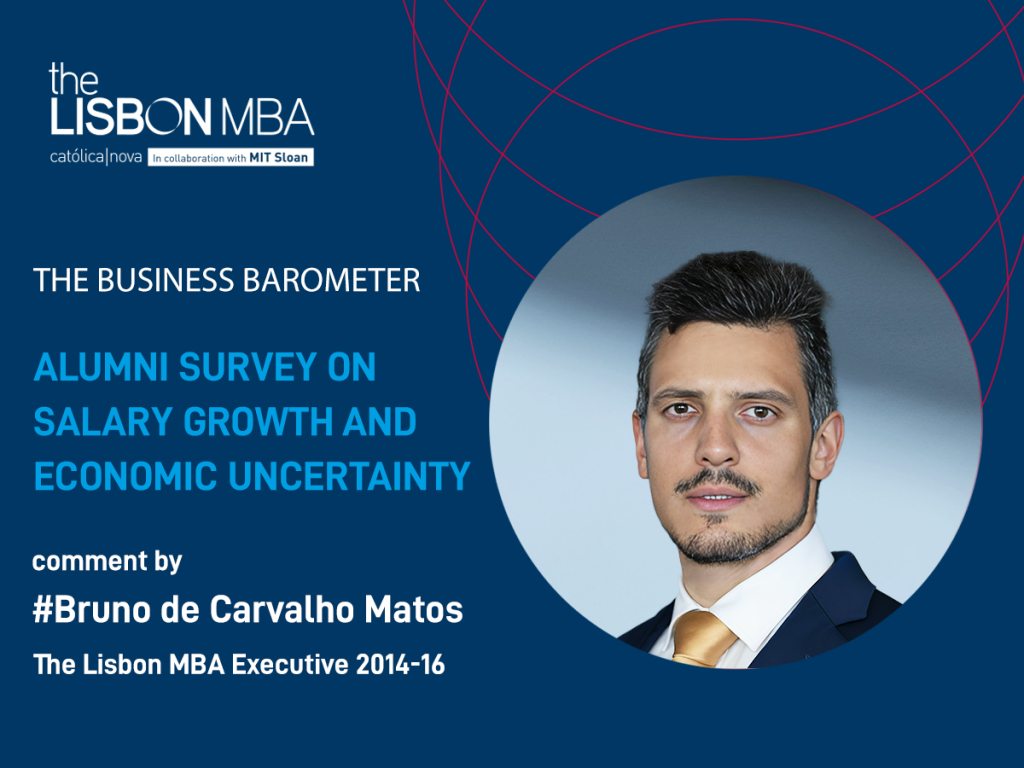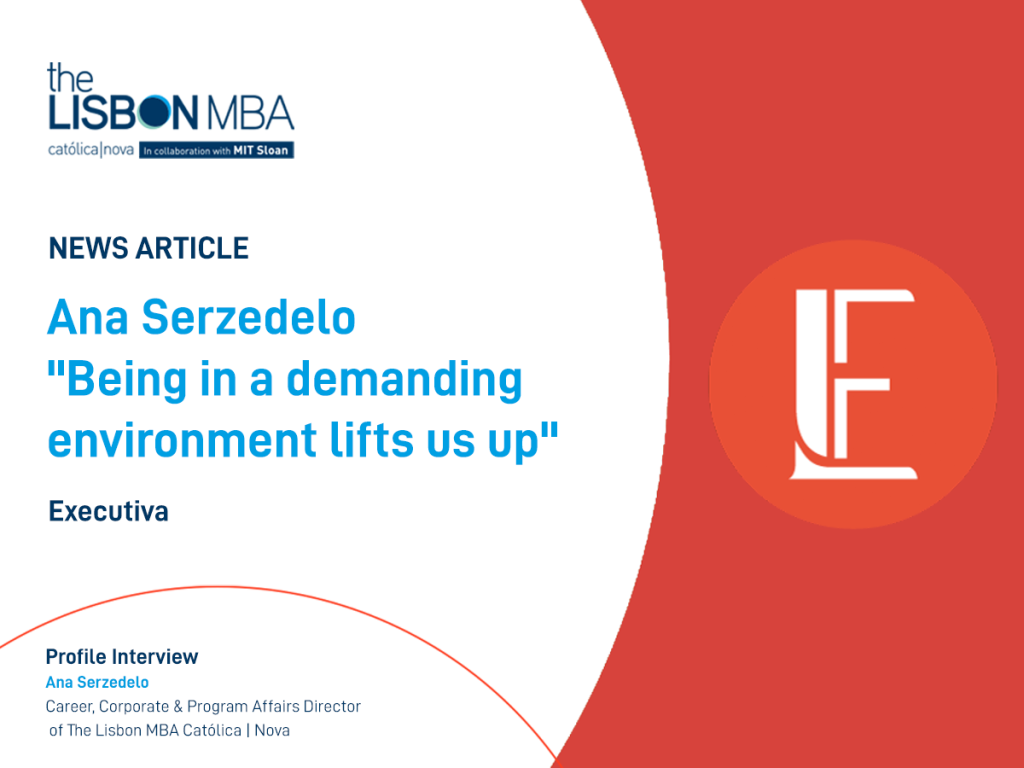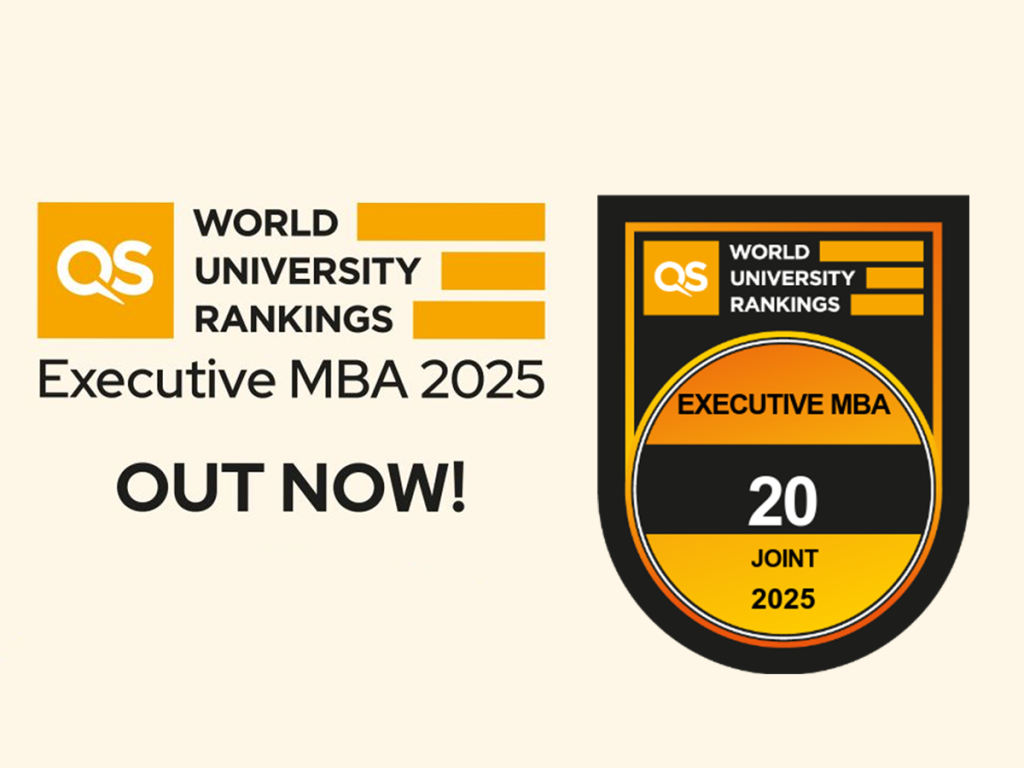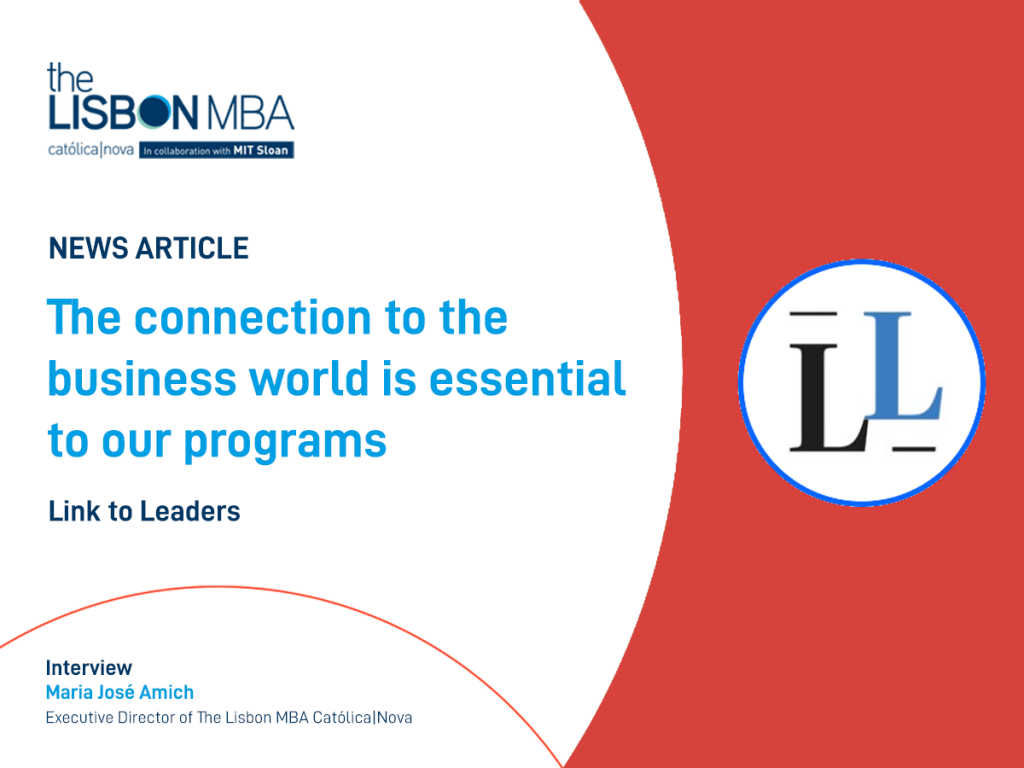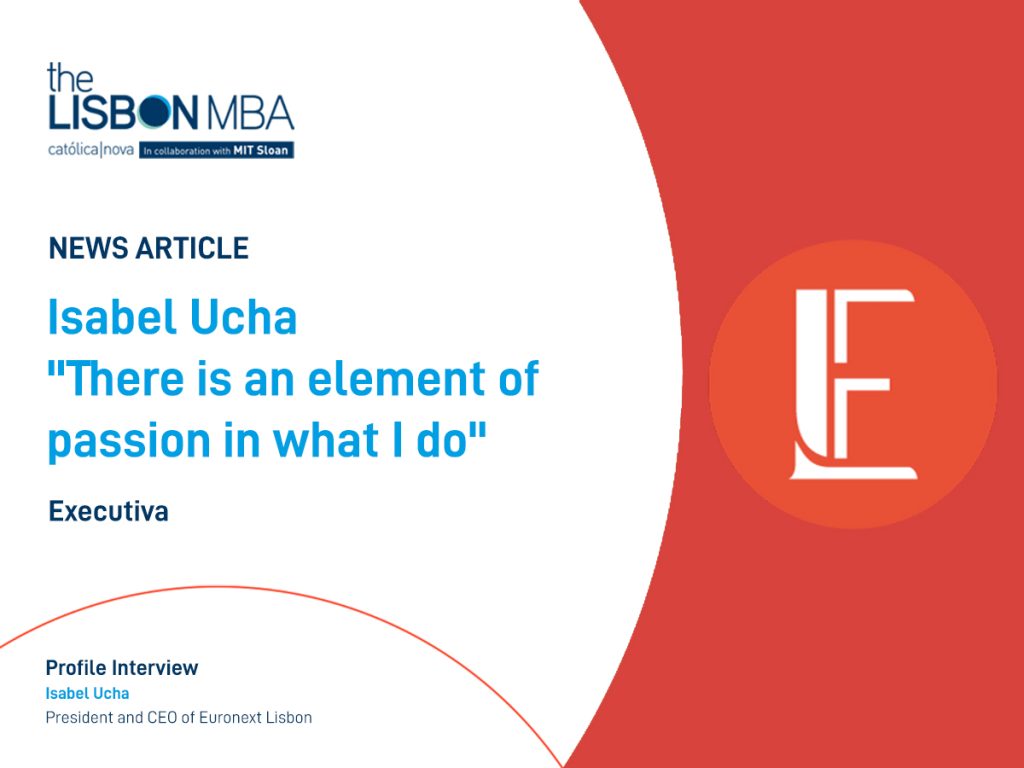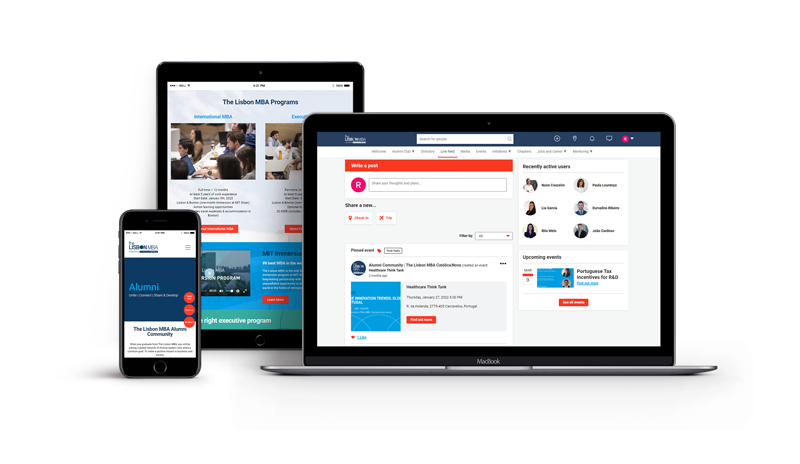Concluding its inspiring interview series spotlighting remarkable women from our community, Executiva interviewed Ana Serzedelo, the Career, Corporate & Program Affairs Director at The Lisbon MBA Católica|Nova. With a background in political journalism and a career spanning business development and education, Ana brings a unique perspective to leadership and transformation. Her passion for helping others to grow is at the heart of her work with the Lisbon MBA students.
Ana Serzedelo’s career is made up of layers and challenges. With a degree in Political Science, she swapped journalism for business development and management and joined The Lisbon MBA Católica | Nova a year ago as Career, Corporate & Program Affairs Director. Convinced of her choices, she believes that learning always involves discomfort.
After graduating in Political Science from Universidade Nova de Lisboa, an internship at the weekly Expresso led Ana Serzedelo to work in political journalism for five years. Her desire to grow led her to do an MBA at IESE in Barcelona, which was decisive in changing course and taking the leap into the business world, where she has accumulated more than 15 years of experience in business development management.
Last year, she joined The Lisbon MBA Católica|Nova as Career, Corporate & Program Affairs Director. She has been given the mission of supporting students to achieve a sustainable career in an environment where they can ‘learn by doing’, one of the pillars of this executive program, number 1 in Portugal, which has once again reaffirmed its prominent position in the top 20 of the best MBAs in the world, now occupying 17th place in the QS Executive 2025 ranking, in the Joint Programs category.
In this new challenge, Ana Serzedelo stresses that more important than helping students find their first job after their MBA is giving them the tools to manage their career path. She points out that today’s careers are not linear, and it’s natural to change jobs, sectors, or countries several times, which is why “teaching how to position yourself, create support networks, communicate your value, and stay motivated is essential to face this scenario with confidence and method.”
You graduated in Political Science, started in journalism, and then moved on to other sectors, from business development to digital to education. What led you to make this change??
Recently, Cristina Campos, our alumna and former CEO of Novartis, took part in an event at The Lisbon MBA and described her career as “journey-driven” rather than “destination-driven.” My career path was also built not on the basis of a fixed plan but through natural stages, guided by curiosity, the desire to grow, and the desire to generate impact. I think I can divide my career into three phases.
The phase associated with political journalism began with the Political Science course at Universidade Nova de Lisboa, which gave me access to an intellectually stimulating and fertile environment for critical thinking. Driven by a curiosity about the events and protagonists that shape society, I applied for an internship at the Expresso newspaper, where I stayed for five years. It was a remarkable experience: closely following parliamentary activity, interviewing key figures, and touring the country on election campaigns for various parties (from the PCP to the CDS-PP). It was a real school of autonomy, rigor and responsibility, where I learned to work with purpose, impact and focus on deadlines.
After five years in publishing, I decided to move into more executive and managerial roles, taking an MBA at IESE in Barcelona. From a social sciences and humanities background, adapting to management issues was challenging but enriching. I gained analytical tools, a problem-solving mindset, a taste for new projects, an international network of colleagues with inspiring backgrounds, and the confidence to face any challenge, above all. After my MBA, I stayed in the media sector. Still, I moved into management roles, specializing in strategic partnerships and new business development – first at Bertelsmann and later at Universia, a social responsibility company of the Santander group dedicated to promoting youth employment, innovation and academic collaboration, with a presence in eight countries. There, I started working on youth employability issues, with the challenge of building a network between universities, companies and the media, in a national context marked by high unemployment rates. The project reached more than 30 higher education institutions, 200,000 users and thousands of companies. In 2018, I took over the general management and administration of the company in Portugal, combining strategy, execution, and institutional governance.
Finally, a year ago, I embraced a new challenge in the education sector by joining The Lisbon MBA Católica | Nova, where I am responsible for the Careers, Corporate Relations, Alumni, and, since September, the operational side of the program. This new phase represents the convergence of several dimensions of my experience: management, social impact, international networks, and talent development, now placed at the service of training future leaders.
What have you learned from this journey?
Looking back, I’d like to highlight a few lessons learned. I’ve always been surrounded by excellent people. I learned much from others in every context, university, journalism, MBA, and business. Being in a demanding environment lifts you up.
The most successful changes have always been incremental: changing roles within a known sector or keeping the roles and changing sectors is more effective than reinventing everything at once.
After exploratory phases, it’s important to make choices and commit to them with conviction. It’s not always about finding the ideal route, but building it with intention.
In more personal terms, I know that I enjoy new projects or challenges and working with different people. I find motivation in the intersection between strategy, execution and relationships.
You have a diverse career with more than 15 years’ experience in general management and leadership. What added value do you draw from this diversity?
I recall a recent piece of advice from António Coutinho, CEO of EDP Innovation, in a session at The Lisbon MBA: to lead, it is essential to know several areas of a company well, from sales to operations, from risk to strategy. This diversity allows you to acquire technical skills and a global vision of how organizations work. In my case, moving between sectors and functions and working in national and international environments has helped me develop adaptability, empathy, strategic thinking, and resilience. I hope I have become more agile and able to make decisions with more context, especially in changing environments such as the education sector.
You recently moved to The Lisbon MBA Católica | Nova. What are the main challenges of this new role, and what is your mission as director of careers and corporate/alumni relations?
The Career Management Center of The Lisbon MBA Católica|Nova’s mission is to support students in achieving a rewarding and sustainable career, not only in the short term but throughout their lives. Our students, mostly international and with 8 to 12 years of experience, are looking to change sector, country, or function, move into management positions, or launch their own projects. A career is, for many, the primary motivation for doing an MBA.
My challenge is to create an environment where they can ‘learn by doing’, one of the pillars of The Lisbon MBA Católica|Nova. We promote activities that inspire them, help them explore alternatives, and prepare them to have an impact. One of the main axes is Action Learning, which involves real projects focused on ESG or entrepreneurship, as well as strategic challenges launched by companies. We look for opportunities that stimulate students, broaden their perspectives, and facilitate a tactical step towards their goals.
But more than just helping them find a first job after their MBA, we want them to acquire the tools to manage their professional career throughout their lives. We know that careers today are not linear: it’s natural to change jobs, sectors, or countries several times, to take time off for personal projects, or to face restructuring contexts. Teaching people how to position themselves, create support networks, communicate their value, and stay motivated is essential to facing this scenario confidently and accurately.
What characteristics do you think brought you to the position you hold?
In direct terms, I think my experience of management, communication, partnerships, international exposure, working with higher education and employability, and the network of contacts I’ve built up are the obvious assets for my current job. However, as with any job, that wouldn’t be good if I didn’t have a genuine motivation to work at The Lisbon MBA Católica|Nova. I love working in the education sector, which is changing and facing very interesting challenges such as innovation, digitalization, lifelong learning, internationalization, incorporating sustainability and social impact, and always maintaining financial sustainability.
On the other hand, it excites me to work with demanding stakeholders, such as our increasingly international students, and to believe that I can support them in some way to have more impact and create value for society.
What was the best career decision you made?
Two decisions marked my path: the internship at Expresso, which launched me into the professional world and taught me a lot, and the MBA, which opened doors and gave me the confidence to change course.
What professional project are you most proud of and why?
In terms of projects, leading a restructuring process was a demanding experience and a life lesson. During my MBA, the entrepreneurship professors said that investors value entrepreneurs who have gone through restructuring, as they tend to manage resources and teams more carefully.
I also remember challenges that seemed difficult from the outset and which were eventually overcome: launching a new travel area in Bertrand / Círculo de Leitores bookstores in which we took thousands of customers to Turkey, launching a website for SMEs in just a few months at Santander, or organizing the Portuguese delegation that took part in the Universia International Meeting of Rectors in Valencia in 2023, attended by the Minister of Higher Education, Elvira Fortunato, and more than 30 rectors and presidents of polytechnics, among many others.
Another important moment was the start of the war in Ukraine in 2022. In the context of Santander, I coordinated the arrival of almost two hundred people in Portugal in a short space of time and with the level of rigor required of a financial entity involving multiple partners. Ultimately, what remains are the moments we overcame, the people we worked with, and the projects we are proud to have been part of.
Were there any mistakes you made along the way that weighed more heavily on you?
Several, but they turned out to be positive turning points. For example, when I chose a more theoretical course where the career paths weren’t obvious, I was more proactive in looking for complementary experiences and ended up at Expresso, where I was fulfilled and learned a lot. When I felt I had spent too long in journalism, I invested seriously in the transition and preparation for the GMAT. In companies undergoing restructuring, I learned to place more value on the sustainability of projects and teams. I learned that working in growing sectors and functions facilitates progress – as the sailors say, it’s better to have the wind at your back. I learned that starting in a ‘school company’, with demanding processes, creates automatisms that remain. And today, I know that learning involves discomfort and that only when we look back can we see the growth that a difficult time has brought us.
Source: Executiva







